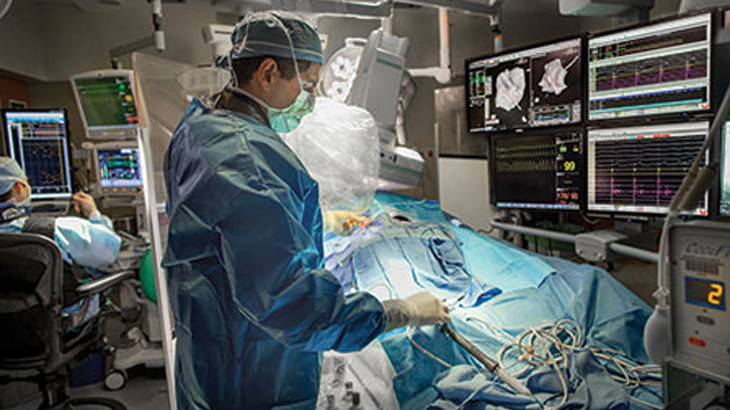Stopping faulty electrical signals in the heart
Ablation is an option to treat atrial fibrillation (AFib). We may use this procedure if other treatments aren’t enough to improve your symptoms.
The doctors in our Electrophysiology program are national leaders in the use of cryoablation, or cold therapy, for treating atrial fibrillation. This option can be less painful for patients and is less likely to affect healthy heart tissue. Our expertise with arrhythmia management allows us to treat even the most challenging cases that may not have responded to other approaches.
What are the available atrial fibrillation ablation options?

We offer several types of atrial fibrillation ablation, including:
Conditions
Sick sinus syndrome
Sick sinus syndrome is a malfunction of the heart’s sinus node, which controls heart rhythms. This causes the heart to beat too quickly or too slowly or leads to long pauses between heartbeats.
Tachycardia-bradycardia syndrome
Tachy-brady syndrome is a type of irregular heartbeat in which the heart fluctuates between beating too quickly and too slowly.
Tests
Echocardiogram
An echocardiogram uses high-frequency sound waves to create images of your heart.
Electrocardiogram (ECG)
An electrocardiogram, also known as an ECG, measures the heart’s electrical activity.
Stress tests
Stress tests are used to assess how your heart works during physical activity. There are several types of stress tests, including treadmill or bike stress tests, nuclear stress tests, stress echocardiograms, and chemically induced stress tests.
Our providers
Location: Change location Enter your location
-
Walter Lawrence Atiga, MD
Electrophysiology
-
Sarfraz A. Durrani, MD
Electrophysiology
-
Margaret Bell Fischer, MD
Adult Congenital Cardiac Disease & Electrophysiology
-
Malick G Islam, MD
Electrophysiology
-
Richard Paul Jones, MD
Electrophysiology
-
Sung W. Lee, MD
Electrophysiology
-
Wale John Ojeyinka, AGACNP-BC
Electrophysiology
-
David Julian Schamp, MD
Electrophysiology
-
Manish Shah, MD
Electrophysiology
-
John Hyoungsub Shin, MD
Electrophysiology
-
Sarah Abigail Stull, PA-C
Electrophysiology
-
Athanasios Thomaides, MD
Cardiology & Electrophysiology
-
Apostolos Tsimploulis, MD
Electrophysiology
-
Cherrie C Webb, CRNP
Electrophysiology
-
Megan Joy Zemrose, PA-C
Electrophysiology
-
Mohit Rastogi, MD
Electrophysiology
Our locations
Distance from Change locationEnter your location
MedStar Southern Maryland Hospital Center
7503 Surratts Rd. Clinton, MD 20735
MedStar Union Memorial Hospital
201 E. University Pkwy. Baltimore, MD 21218
MedStar Washington Hospital Center
110 Irving St. NW Washington, DC 20010
MedStar Georgetown University Hospital
3800 Reservoir Rd. NW Washington, DC, 20007
Additional information
Electrophysiology Program
We are leaders in developing and using the latest procedures and technologies to treat heart rhythm disorders, and our cardiac electrophysiology laboratory is one of the most sophisticated in North America.
Ask MedStar Heart & Vascular Institute
Have general questions for our heart and vascular program? Email us at AskMHVI@medstar.net. If you have clinically-specific questions, please contact your physician’s office.









